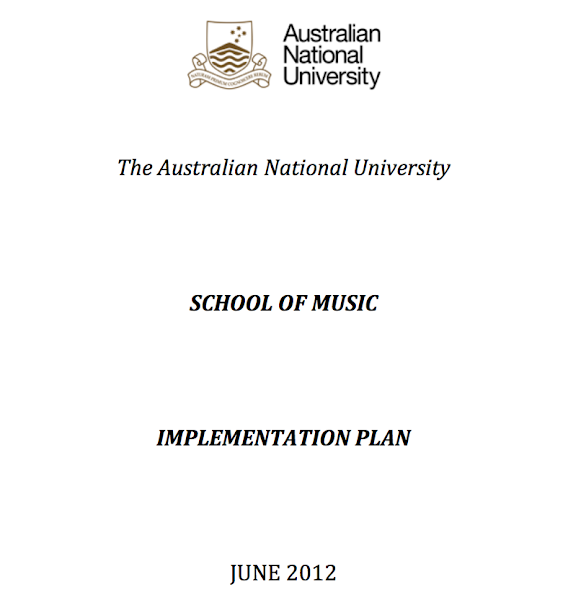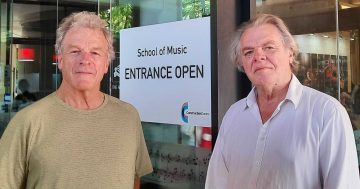
The troops have been summonsed to hear what ANU Vice Chancellor Ian Young is going to do to the School of Music.
UPDATE 15/06/12 10:21 And now we have the man himself’s announcement:
Degree Structure. There will be a single Bachelor of Music (BMus) degree, with two available streams of study: Music Performance and Music Inquiry. Students will undertake a major in one stream and a minor in the other. Entry to the Performance major will be via audition, ensuring a high level of performance skills. Entry to the Inquiry major will be via Year 12 results, widening the pool of students who can access the degree.
There will be a target entry each year of 50 new students undertaking the Performance major, and at least 30 for the Performance minor (as compared with the approximately 60 students entering the present BMus program, not all of whom continue to focus on performance throughout their degree, and the less than 10 now entering the present Bachelor of Professional Music Practice program). This means that there should continue to be at least as many students studying Performance – and contributing to the musical life of Canberra – as at present.
All Performance students will continue to have access to a minimum of one hour a week of one-on-one tuition, as at present. Some of that is expected to be provided by School of Music staff, but most of it will in future be delivered by approved external tutors, with provision made for travel outside Canberra if necessary.
The Music Inquiry stream will focus on composition, musicology, and on music education, policy and management, imparting the knowledge and practical research skills required by those music graduates (presently over 80 per cent of those graduating from the ANU School of Music) who may not have careers primarily in performance.
The new degree is based on the model adopted by music schools such as those at Cambridge, Oxford and Harvard, with a ‘university’ rather than a ‘conservatorium’ structure. While retaining a strong performance focus, the overall curriculum will be broader, the staff will be required to be research active, and most one-on-one performance training will be delivered by external professionals – not least because of the extraordinary cost of maintaining in-house expertise across the thirty or more instruments which might be expected to be taught in a traditional conservatorium.
Implications for Staff. The changes to the degree structure will mean that staff numbers at the School will decrease overall by 13 full-time-equivalent positions: from 24 academic positions to 13, and from 10 administrative positions to 8. (A number of existing positions, e.g. ARC Fellow, will be unaffected by the changes; and the number of external tutors and other casual and sessional staff – now numbering around 30 – is expected to increase.)
The new academic staff level of 13 (for a total student body of approximately 200) may be compared, for example, with the Faculty of Music at Cambridge, which has a total of 14 academic staff (for a student body of approximately 250).
The reductions will be achieved in line with the provisions of the ANU Enterprise Agreement, with the process embracing internal transfer, planned retirement, voluntary separations, voluntary transition to part-time employment and, as a last resort, redundancy.
In the new core academic staff structure of 13 it is anticipated that – apart from the Head of School – 6 positions will be primarily Performance-focused and 6 primarily Inquiry-focused, but with an expectation that in at least some cases the staff member would be able to make a significant research or teaching contribution to the other stream. All positions will be expected to be research active.
Implications for Existing Students. All current students will be able to successfully complete the expected outcomes of their degree program. Detailed advice will be given on mapping individual pathways, with particular attention paid to any problems that may arise should a present School academic staff member with one-to-one teaching responsibilities not secure a place in the new staffing structure.
Implications for the wider Canberra Community. The University understands the role that the School has long played in music-making in the wider community, and believes that role will continue under the new curriculum and staffing arrangements. There will continue to be a strong ongoing supply of performance-trained students, and significant performance expertise retained in the School’s staff.
So far as the Canberra Symphony Orchestra is concerned – a key cultural institution – it is understood that on average only 9 students and less than 4 staff have regularly played in it, so the adverse impact of any change seems likely to be small, given that its full strength is some 70 players. The provision of music tuition by ANU staff to school children in Canberra is not impacted by the changes. Nor will community access to Llewellyn Hall be in any way affected.
Implications for the wider ANU Community. The University recognises that institutions like the School of Music will always need a degree of cross-subsidy, and will continue to provide such a subsidy to the School of Music of $1.4 million per year. But the present deficit in the School’s budget is running at more than double this amount – $2.9 million. This shortfall is more, for example, than the whole annual budget of the School of Philosophy, which ranks sixth in the world. Deficits of this level are unsustainable, and create an unacceptable burden for the rest of the University community.
In the past, private philanthropy has played an appreciated role in the School, particularly in the provision of student scholarships. I hope it will play an even more substantial role in the future. The new degree structure lends itself to increasing the level of one-to-one tuition through the creation of an endowment, and we would warmly welcome support from private or business donors for any endeavour that would further enhance the educational experience provided by the School and its effective community outreach.
Here’s the implementation plan:
UPDATE 15/06/12 13:48: The NTEU is very upset
The National Tertiary Education Union (NTEU) has condemned today’s announcement by the ANU Vice-Chancellor, Ian Young to savagely cut the School of Music.
ACT Division Secretary, Stephen Darwin, said ‘it is now apparent that ANU has engaged in a sham consultation process around its proposed cuts to the School of Music, as despite overwhelming staff, student and community opposition, nothing has changed’.
UPDATE 18/06/12 10:38: Here’s the video of the announcement:
https://www.youtube.com/watch/?v=fMKpmGNlSZ8




















